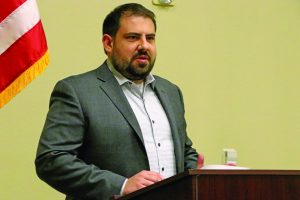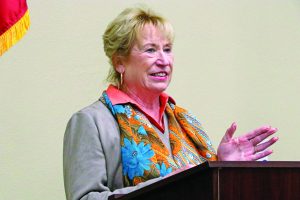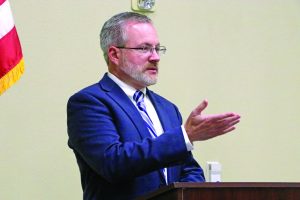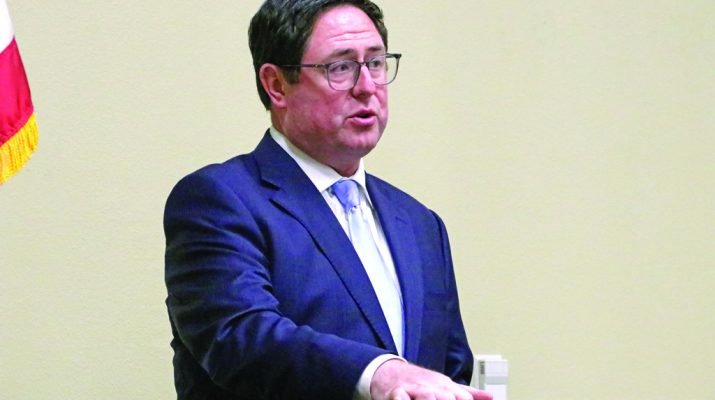On Oct. 17, Grow Nebraska’s co-chairs Congressman Mike Flood, Senator Eliot Bostar and Senator Lou Ann Linehan gathered at the Western Nebraska Regional Airport as part of a statewide tour to promote Amendment 1, a constitutional amendment that would allow political subdivisions that operate or own an airport to allocate funds to developing new or expanded commercial passenger flights.
Amendment 1 will go before voters during the general election. It was passed unanimously in the Nebraska Legislature.
Bostar spoke to the crowd gathered at the Western Nebraska Regional Airport first, explaining that Nebraska has a disadvantage in attracting commercial air service.
“The tools that every other state has access to for developing commercial air service at our airports are not available to us here in Nebraska,” said Bostar. “These are the very tools that airlines have come to expect as part of the system in which they do business, the system in which they decide where to invest in creating air service. We don’t have that in Nebraska.”

Bostar explained that an opinion regarding Nebraska’s constitution issued by Attorney General Doug Peterson in 2020 prevented airports from entering into the agreements that would expand commercial air service. Bostar explained that Amendment 1 would ameliorate that issue.
“Nebraska has incredible opportunities, and our airports are a key component in our business development, in our tourism and economic growth for the state,” Bostar said. “It is essential that we are able to compete on a level playing field with every other state in the country. I am proud that the Nebraska Legislature unanimously agreed with that position and voted to place this on the November ballot. Now it goes to the people—it goes to the public of Nebraska to make the final decision as top whether or not we should make this change in our state constitution.”
In the Panhandle, the passage of Amendment 1 would directly impact Alliance, Chadron and Scottsbluff. Flood explained that he is from Norfolk, noting the impact on the community if commercial air service is lost.
“Eighteen years ago, the essential air service stopped operating in Norfolk, Nebraska, and I know what that means for economic development. There’s a lot of companies that only look at towns that have direct air service. There are a lot of employees that will only look at communities that have the ability to link to a larger airport. To make rural Nebraska successful, we have to do everything in our power to give our regional airports the tools they need to bring in and sustain quality and reliable air service.”
Flood explained that the decision impacts all walks of life, from growing business to seeking access to critical health care treatments. He emphasized that the issue on the ballot will not raise taxes, noting its support from the State Chamber of Commerce, the Scottsbluff Airport authority and many other organizations.
“It does not raise anybody’s taxes,” said Flood. “It does not increase any revenue. It just gives airports the authority to use the resources they currently have to enter into agreements through their public authority with airlines. That’s good for all of us. More flights into Scottsbluff is good for us. More flights into Kearney is good for us. Hopefully in our state’s capital city, we will see even more direct flights because this is an issue we all share. There’s nothing nefarious about this.”

Linehan, who chairs Nebraska’s Revenue Committee, explained that the passage of Amendment 1 could be a way to attract young people to rural Nebraska.
“It’s good for business; it’s good for growth, but what I think is critical about this, having air service, we have heard again and again we have got to get young people to Nebraska,” Linehan said. “The further you go west, the worse it gets. You’re not going to get young people to a town with no commercial air service, because that group of people, they can work anywhere in the country. Everybody needs people—we need them. They travel for leisure, to see their families. They’re not going to live someplace where they don’t have air service. If we want the whole state to grow, which we do, we need to pass Amendment 1.”

President of the Nebraska Chamber of Commerce Bryan Slone also spoke in favor of passing Amendment 1, noting that the future of the state depends upon bringing people to Nebraska’s communities.
“In a generation where you can work and live anywhere, we have an inherent advantage right here in Scotts Bluff County and the surrounding counties in having the best quality of life of anywhere in the world,” said Slone. “And yet, if you can live in some place which is the best quality of life, and have the ability to travel anywhere you want to, this can be the most attractive place for the next generation. This is about building for the future.”
Slone explained that commercial airport services see more than 66,000 jobs throughout the state of Nebraska, noting it contributes $2.2 billion of economic impact in the state.
“This is a very significant part of our economy and needs to become a much larger part of our economy as we go forward,” Slone said. “I can’t think of very many things that are more important to the growth of our communities, the growth of our population and the growth of our economic opportunity going forward.”

Zac Karpf, president of Platte Valley Bank explained that having commercial air service is vital to growing business, citing his own experience of utilizing Western Nebraska Regional Airport and the connectivity it provided before the pandemic.
“Things have changed, and the connectivity is different now,” said Karpf. “I think it will always be different, and Amendment 1 is going to give airports tools to reflect that. Amendment 1 would allow us to compete better. We have so much competition here from our bordering states, Wyoming and Colorado, that in Scottsbluff, not having a tool like this really puts our airport at risk and our connectivity at risk. This just helps to level the playing field with those other states.”
Bostar in response to a question, noted that if Amendment 1 passes, it will allow airports the option of engaging in revenue guarantee agreements with airlines, which is a tool utilized throughout the United States. He explained it would form a strategic partnership between the airline, the airport and the community that operates the airport. Bostar said local elected officials would be responsible for making decisions on attracting commercial air service and the type of agreements in which they could enter.

